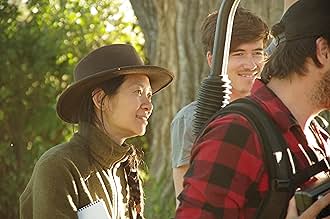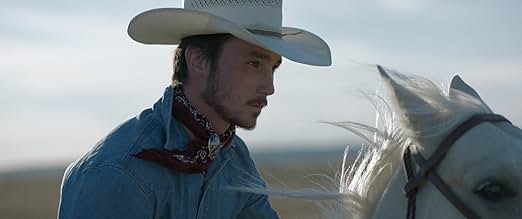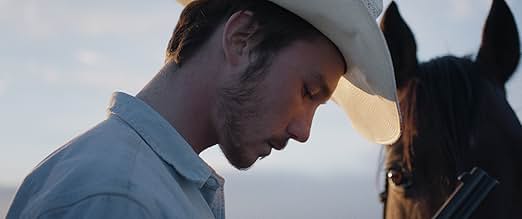PUNTUACIÓN EN IMDb
7,4/10
21 mil
TU PUNTUACIÓN
Tras sufrir un golpe en la cabeza que podría haber sido mortal, un joven cowboy intenta forjarse una nueva identidad en el corazón de América.Tras sufrir un golpe en la cabeza que podría haber sido mortal, un joven cowboy intenta forjarse una nueva identidad en el corazón de América.Tras sufrir un golpe en la cabeza que podría haber sido mortal, un joven cowboy intenta forjarse una nueva identidad en el corazón de América.
- Premios
- 25 premios y 59 nominaciones en total
Terri Dawn Pourier
- Terri Dawn
- (as Terri Dawn Jandreau)
Allen Reddy
- Bill
- (as Alan Reddy)
Argumento
¿Sabías que...?
- CuriosidadesWriter and director Chloé Zhao first met Brady Jandreau during her research for her earlier film, Songs My Brothers Taught Me (2015). She visited the ranch where Jandreau was working and he was teaching her how to ride a horse. She wanted to put him in one of her films, and when he had the accident that left him with life changing head injuries, she decided to base the script for her next film on his story.
- Citas
Brady Blackburn: If any animal around here got hurt like I did, they'd have to be put down
- ConexionesFeatured in WatchMojo: Top 10 Best Movies of 2018 (So Far) (2018)
- Banda sonoraBattleground
Performed by Lucian Blaque
Written by Mark Kevin Wilson
Courtesy of Fervor Records
Reseña destacada
I was infatuated back in 1971/72 with Hollywood' brief but productive dalliance with the Rodeo film genre, of which Steve Ihnat's "The Honkers" was my favorite alongside the far-better publicized "Junior Bonner", "When the Legends Die" (the closest one to "The Rider") and "J.W. Coop". Chinese director Chloe Zhao takes a neo-Realist stab at the format with this affecting, strong and experimental film.
Unlike Clint Eastwood's unsuccessful recent film where he had the American heroes of the French railway terrorist incident play themselves on screen, Chloe has recruited real-life Native Americans from the South Dakota rodeo milieu to play fictional characters close enough to their real-life personae to establish an immediate and realistic connection. Rodeo has long been a metaphor for Western movie themes, especially those end of an era notions favored by Western masters Sam Peckinpah and John Ford, and here Zhao takes the concept one step further by having these modern day cowboys personified by Native Americans of the Lakota tribe whose culture was effectively destroyed by us "Americans", including the cowboys of old.
The central protagonist Brady has a face and utterly stoic demeanor the camera loves - a Bronson figure who happens to have the handsome features of a Channing Tatum, but never hitting a false note. His dilemma recalls the Greek myth of Sysiphus, rolling that boulder up the hill only to have it roll back down endlessly, accomplishing nothing. But the difference here is that although he cannot recover from the rodeo accident which renders him unfit to ride anymore (actually, in real-life Brady was injured in a car accident, not from rodeo performance) he is presented as a brilliant horse whisperer, adding great depth and panache to the movie.
His best friend Lance, crippled from rodeo, offers the moving sentimentality that Chloe otherwise scrupulously avoids in her filmmaking, using spectacular visual imagery to give the movie a strength that mere documentary technique wouldn't allow. Subsidiary characters like Brady's autistic sister and stern, incapable of expressing his love dad, are potent real-life people rather than Hollywood constructs, though many a character actor would leap at the chance to play these roles.
As I watched the movie I thought of many Sports-related pictures that had covered similar ground, perhaps more intellectually and that achieved classic status. Certainly Brando in Kazan's "On the Waterfront" as the boxer who "coulda been a contender" presents a mirror image to Brady's hero, though their acting styles are diametrically opposed. Kurosawa's "Dersu Uzala" is the most brilliant of these movies (but not about sports) of a strong spirit overcoming physical hardship, and I was somewhat surprised that director Zhao chose to make the character's Native American background so subtle in terms of her screenplay, as opposed to Kurosawa in a Russian movie emphasizing the outsider nature of Dersu the Siberian hunter from an ethnic minority. Perhaps it is the lack of a stronger, more universal theme as developed in the Kazan and Kurosawa films that prevents "The Rider" from ascending to all-time classic status. But it is still a wonderful movie.
Unlike Clint Eastwood's unsuccessful recent film where he had the American heroes of the French railway terrorist incident play themselves on screen, Chloe has recruited real-life Native Americans from the South Dakota rodeo milieu to play fictional characters close enough to their real-life personae to establish an immediate and realistic connection. Rodeo has long been a metaphor for Western movie themes, especially those end of an era notions favored by Western masters Sam Peckinpah and John Ford, and here Zhao takes the concept one step further by having these modern day cowboys personified by Native Americans of the Lakota tribe whose culture was effectively destroyed by us "Americans", including the cowboys of old.
The central protagonist Brady has a face and utterly stoic demeanor the camera loves - a Bronson figure who happens to have the handsome features of a Channing Tatum, but never hitting a false note. His dilemma recalls the Greek myth of Sysiphus, rolling that boulder up the hill only to have it roll back down endlessly, accomplishing nothing. But the difference here is that although he cannot recover from the rodeo accident which renders him unfit to ride anymore (actually, in real-life Brady was injured in a car accident, not from rodeo performance) he is presented as a brilliant horse whisperer, adding great depth and panache to the movie.
His best friend Lance, crippled from rodeo, offers the moving sentimentality that Chloe otherwise scrupulously avoids in her filmmaking, using spectacular visual imagery to give the movie a strength that mere documentary technique wouldn't allow. Subsidiary characters like Brady's autistic sister and stern, incapable of expressing his love dad, are potent real-life people rather than Hollywood constructs, though many a character actor would leap at the chance to play these roles.
As I watched the movie I thought of many Sports-related pictures that had covered similar ground, perhaps more intellectually and that achieved classic status. Certainly Brando in Kazan's "On the Waterfront" as the boxer who "coulda been a contender" presents a mirror image to Brady's hero, though their acting styles are diametrically opposed. Kurosawa's "Dersu Uzala" is the most brilliant of these movies (but not about sports) of a strong spirit overcoming physical hardship, and I was somewhat surprised that director Zhao chose to make the character's Native American background so subtle in terms of her screenplay, as opposed to Kurosawa in a Russian movie emphasizing the outsider nature of Dersu the Siberian hunter from an ethnic minority. Perhaps it is the lack of a stronger, more universal theme as developed in the Kazan and Kurosawa films that prevents "The Rider" from ascending to all-time classic status. But it is still a wonderful movie.
- lor_
- 15 abr 2018
- Enlace permanente
Selecciones populares
Inicia sesión para calificar y añadir a tu lista para recibir recomendaciones personalizadas
- How long is The Rider?Con tecnología de Alexa
Detalles
Taquilla
- Recaudación en Estados Unidos y Canadá
- 2.419.031 US$
- Fin de semana de estreno en EE. UU. y Canadá
- 42.244 US$
- 15 abr 2018
- Recaudación en todo el mundo
- 3.436.124 US$
- Duración1 hora 44 minutos
- Color
- Mezcla de sonido
- Relación de aspecto
- 2.35 : 1
Contribuir a esta página
Sugerir un cambio o añadir el contenido que falta

Principal laguna de datos
By what name was The Rider (2017) officially released in India in Hindi?
Responde
















